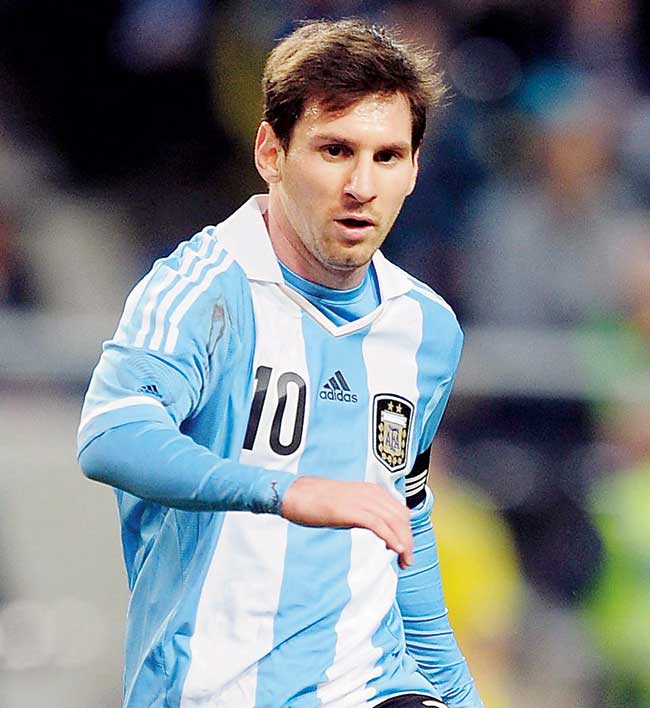As Eduardo Galeano, the Uruguayan writer, wrote in Soccer in Sun and Shadow, "They adored Maradona for his prodigious acrobatics, and because he was a dirty God, a sinner, the most human of the deities"

Diego Maradona representing Argentina in a Nations Cup match against Russia at Berlin in 1987. Pic/Getty Images
"Enrique hooks it and passes it to Diego, Maradona on the ball now. Two closing him down. He breaks away down the right, the genius of world football. He goes past a third, looks for Burruchaga. Maradona forever! Genius, genius, genius! Goal! Goal!
Maradona representing Argentina in a Nations Cup match against Russia at Berlin in 1987. Pic/Getty Images
"Sorry, I want to cry! Good God! Long live football! What a goal! Diego! Maradona! I have to scream, forgive me. Cosmic kite, which planet did you come from? To leave behind so many English, to turn the whole country into a clenched fist, shouting for Argentina. Thank you God, for football, for Maradona, for these tears and for this scoreline: Argentina 2 England 0."
That was Victor Hugo Morales describing perhaps the greatest World Cup goal ever scored, Diego Maradona's second against England in Mexico. Even now, nearly three decades later, the sheer magnificence of it dovetails beautifully with the breathless excitement and emotion of Morales's commentary. You may be watching the footage for the hundredth time, but the sequence of twists and feints allied with immaculate ball control will make you gasp every time.
As Eduardo Galeano, the Uruguayan writer, wrote in Soccer in Sun and Shadow, "They adored Diego Maradona for his prodigious acrobatics, and because he was a dirty God, a sinner, the most human of the deities. Anyone could see in him the walking synthesis of human weaknesses – arrogant, overbearing, deceitful, swaggering. But perhaps of all the crimes Maradona committed, the most profound was the sin of being the best."
The 'they' Galeano refers to includes thousands of people of my generation. We may have watched sport for more than three decades now, but there is nothing in our mental archives to compare with what Maradona did over the course of a month in 1986. Lothar Mattheus had an outstanding World Cup when West Germany won the trophy in 1990. Romario was often sublime as Brazil triumphed in 1994.

Lionel Messi
We remember 1998 for Zinedine Zidane's virtuoso display in the final, while 2002 was Ronaldo's redemption song. The same Zidane's angry headbutt is the compelling image of 2006, while four years later, Spain eased their way to the title with a performance that might have been titled: A Clockwork Red.
Incomparable
Do any of them compare to what Maradona did though? Not really. Few footballers will ever achieve what he did, and not just in the Argentina shirt. His best years at club level were with teams that were rank outsiders. When he took Argentinos Juniors to second place in the Metropolitano (the Argentine championship) in 1980, it was their best finish since the professional era began in 1931.
In 1986-87, when his Napoli side won both Serie A and the Italian Cup, it marked the first time a team from the (relatively impoverished) southern half of the mainland had won the league. That victory was repeated in 1989-90, and there was also UEFA Cup glory to savour in an era of unprecedented success.
The reluctance to place Lionel Messi on the same pedestal, especially back home in Argentina, stems primarily from two reasons. His greatest moments have come in the Barcelona shirt. As a team, Barcelona had been famous around the world for nearly half a century before Messi even scored a senior goal for them.
It wasn't like he emulated Maradona and took an obscure team to the greatest heights. And like Alfredo Di Stefano, the most formidable Argentine player of the pre-Maradona years, Messi has yet to deliver a defining performance with the national side. Di Stefano was one of the all-time greats, but compared to Pele and Maradona, so few have heard of him or are aware of his feats. He never played a World Cup with Argentina, who he last represented at the age of 21, or with Spain, his adopted land.
Messi has played two. In 2006, he scored in the group stages, but was a frustrated spectator on the bench as Jose Pekerman's befuddling tactics resulted in a quarter-final exit against Germany. Four years later, he was the main creative outlet, but again Germany proved far too strong in the last eight. Messi, like most of his teammates, was anonymous, in a naïve tactical system that the Germans simply shredded.
Messi is the finest player of his generation. But ahead of what might be his best chance to win a World Cup winners' medal, he would do well to listen to what Maradona said about Mexico. "I lived the World Cup to the full, like everything I've done in my life," said the man some fans called D10S – a combination of the No 10 shirt he wore and the Spanish word for God. Messi, who appeared careworn at times during the last season, needs to embrace the experience and not care too much about the expectation. He has what it takes to be another cosmic kite.
Dileep Premachandran is Wisden India's editor-in-chief
 Subscribe today by clicking the link and stay updated with the latest news!" Click here!
Subscribe today by clicking the link and stay updated with the latest news!" Click here!







